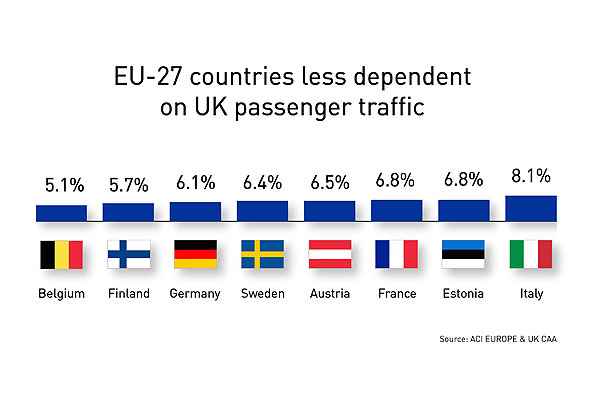More than 1 in every 2 passengers (53.5%) handled by UK airports are flying to/from the EU27. More than 1 in 10 passengers (11.5%) handled by EU27 airports are flying to/from the UK.
LONDON – With the United Kingdom (UK) about to notify its intention to leave the European Union (EU), ACI Europe expressed concerns about the prospects of ongoing uncertainty over the rules that will come to govern aviation between the UK and the remaining EU Member States (EU27). This needs to be quickly resolved to provide clarity for passengers, airlines and airports so as to enable continued investment in growing our collective connectivity. The airport trade association also cautioned about the economic consequences of the UK aviation market not remaining closely integrated within the EU27 aviation market.
Speaking at the 9th ACI Airport Economics & Finance Conference in London, Olivier Jankovec, Director General of ACI EUROPE said “The ‘sequencing’ of the Brexit negotiations means talks will initially focus on agreeing exit terms for the UK, before they eventually come to define the new relationship between the UK and the EU27 as of 2019. This implies that the aviation industry will be left in the dark for many more months to come about what will happen. Unless quickly resolved, this uncertainty will end up constraining route network development for airports, ultimately affecting air connectivity for their communities. This is due to the fact that airline route planning requires both long lead times and legal certainty.”
Two Year Deadline Potentially Exposes Passengers
Furthermore, with Brexit negotiations framed by a strict 2-year deadline, one cannot presume an agreement will be reached on exit terms. Failure to do so would mean the UK exiting the EU without the terms of its new relationship with the bloc being clearly defined. For aviation, this could well result in market access falling back on more restrictive bilateral provisions between the UK and individual EU27 States – with potentially disruptive effects on air connectivity and the economy. In particular, consumers could find themselves having purchased air tickets that airlines might not be able to honour in the absence of an appropriate legal basis for them to fly.
Jankovec commented “As responsible businesses, at this stage we simply cannot rule out a cliff-edged scenario for Brexit and aviation. The potential impact of this on air connectivity, consumers and the wider economy needs to be addressed by Brexit negotiators – on both sides. This means that adequate contingencies need to be established promptly in case the UK would exit the EU without any agreement on its future relationship with the bloc”.
UK & EU27 Aviation markets Interdependence
Calling on the EU and UK negotiators to prioritise aviation and ensure the UK and EU aviation markets remain as closely integrated as possible post-Brexit, ACI Europe brought the interdependence of both markets into the spotlight:
- More than 1 in every 2 passengers (53.5%) handled by UK airports are flying to/from the EU27.
- More than 1 in 10 passengers (11.5%) handled by EU27 airports are flying to/from the UK.
UK airports are on average far more dependent on air traffic to/from the rest of the EU than EU27 airports on air traffic to/from the UK. However, there are significant variations within the EU27 in terms of exposure to air traffic to/from the UK. Accordingly, the markets most reliant on air traffic to/from the UK are: Ireland (39.2%), the Slovak Republic (33.2%), Cyprus (31.3), Malta (27.9%), Poland (20.2%), Lithuania (19.8%) and Spain (17.3%).
Beyond these national markets, air traffic to/from the UK is vital for many individual regional airports across the EU27 – and their communities.
Value of the Single Aviation Market, Second to None
ACI Europe further stressed the extent to which the full integration of the UK and EU aviation markets brings crucial economic benefits. It estimates² that air traffic between the UK and the EU27:
- Supports 270.000 jobs in the UK and is associated with 15.4 billion euros of the country’s GDP.
- Supports 285.000 jobs in the EU27 and is associated with 13.7 billion euros of the bloc’s GDP.
Jankovec concluded “The contribution of aviation to the economies of both the UK and the EU27 is largely conditioned by the full integration of their aviation markets – enabled by the Single Aviation Market. This means that this contribution depends not just on the freedom to fly and unrestricted market access for airlines, but also on a wide range of common rules. These common rules are an essential part of the fabric of European air transport. They avoid costly duplications and conflicting requirements.
Let’s be clear: losing this integration between the UK and EU aviation markets is akin to putting an end to a relationship which creates tremendous value and brings extensive mutual benefits.”
Vicky is the co-founder of TravelDailyNews Media Network where she is the Editor-in Chief. She is also responsible for the daily operation and the financial policy. She holds a Bachelor's degree in Tourism Business Administration from the Technical University of Athens and a Master in Business Administration (MBA) from the University of Wales.
She has many years of both academic and industrial experience within the travel industry. She has written/edited numerous articles in various tourism magazines.
































































































































































































































